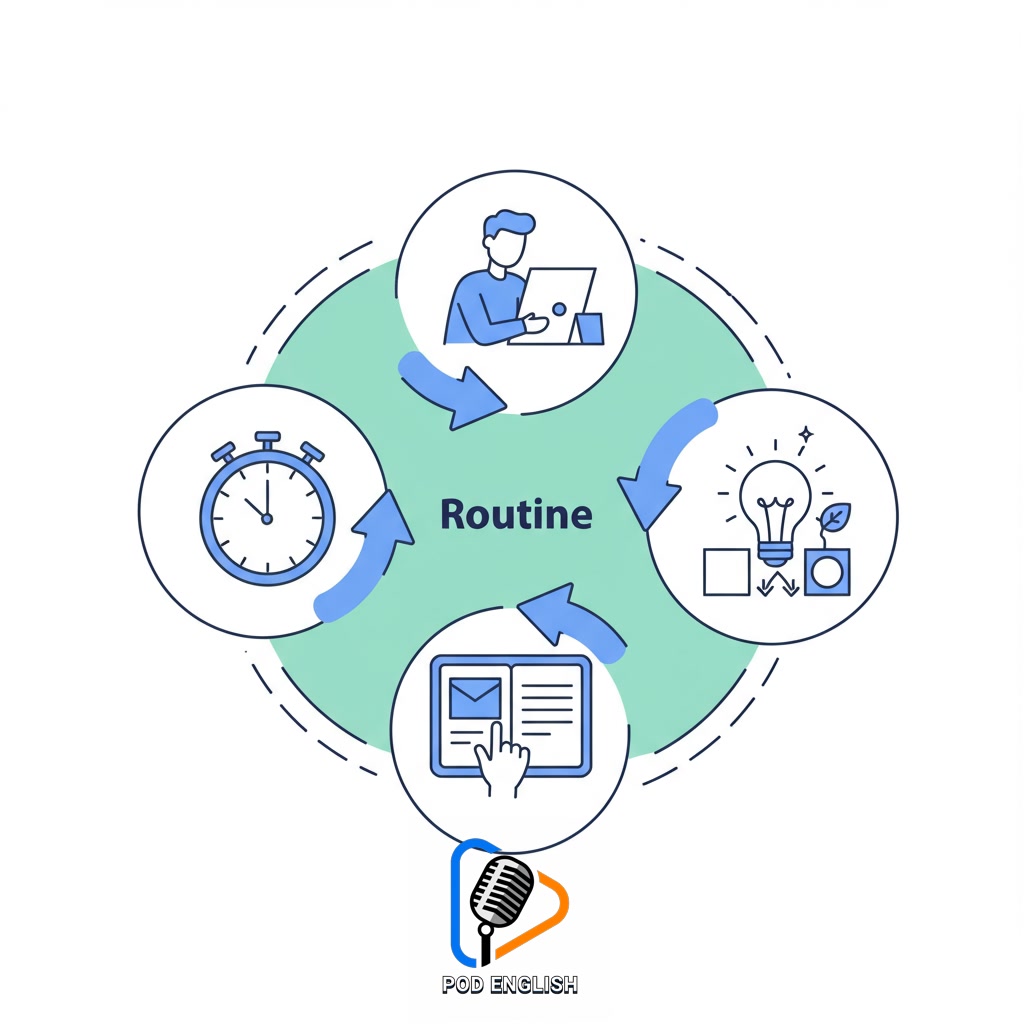Learn English
The Power of Habit: Your Key to Learning and Studying English Daily

This content explores how leveraging the power of habit is fundamental to consistent and effective daily English learning. By establishing regular routines, individuals can unlock their potential to master the language. It highlights the importance of integrating the process to study English into your daily life. Building strong habits is presented as the essential key for sustained progress and fluency in English acquisition.
Table of Contents
- Section 1: Why Habit is Your Secret Weapon for Learning English
- Section 2: Understanding the Habit Loop: Cue, Routine, Reward in English Study
- Section 3: Designing Your Daily English Study Habit: Practical Steps
- Section 4: What to Include in Your Daily English Practice Routine
- Section 5: Maintaining Momentum: Strategies for Consistent English Study
- Section 6: The Long-Term Impact: How Daily Habit Leads to English Fluency
Section 1: Why Habit is Your Secret Weapon for Learning English
Learning English effectively isn’t just about having natural talent or finding a magic shortcut; it’s fundamentally about consistency. This is where the power of habit becomes your secret weapon. Instead of relying on fleeting motivation or willpower each day, establishing a daily English study habit automates the process. It transforms learning from a sometimes overwhelming task into a regular, manageable part of your routine. By committing to small, consistent actions – like reviewing vocabulary for ten minutes or listening to a short podcast – you build momentum and make steady progress without even realizing it. Over time, these small, habitual steps accumulate into significant improvement, unlocking your potential for fluency. This quiet, consistent effort is the true secret weapon that makes daily English study not only possible but genuinely effective.

Why Habit is Your Secret Weapon for Learning English
Section 2: Understanding the Habit Loop: Cue, Routine, Reward in English Study
Building on the idea of consistency, let’s delve into the fundamental structure that underpins any habit: the habit loop. This loop consists of three distinct parts: the Cue, the Routine, and the Reward. The Cue is the trigger that tells your brain to go into automatic mode and determines which habit to use. In the context of English study, this could be something like seeing your flashcards, hearing a specific notification, or simply arriving home from work. The Routine is the behavior itself – the act of studying English, whether it’s practicing pronunciation, reviewing vocabulary, or listening to a podcast. Finally, the Reward is the positive outcome that helps your brain figure out if this specific loop is worth remembering and repeating in the future. For English learners, this could be the feeling of understanding a complex sentence, the satisfaction of completing a study session, or recognizing your own progress. Understanding this loop is key to consciously designing and reinforcing effective English study habits.

Understanding the Habit Loop: Cue, Routine, Reward in English Study
Section 3: Designing Your Daily English Study Habit: Practical Steps
Building on the idea of consistency and the habit loop (Cue, Routine, Reward), the next crucial step is designing your personal daily English study habit. This involves consciously choosing each element of the loop to fit your life. Start by identifying a reliable “Cue” – perhaps a specific time like after breakfast, or a preceding activity like finishing work. Next, define your “Routine” clearly: what exactly will you study (e.g., 15 minutes of listening practice, reviewing flashcards, reading a short article)? Keep it specific and manageable initially. Finally, determine a small, immediate “Reward” that follows the routine, reinforcing the behavior – maybe enjoying a favorite song, a short break, or a cup of tea. By intentionally designing these three parts, you create a clear path for your brain to follow, making consistent study much easier to maintain.

Designing Your Daily English Study Habit: Practical Steps
Section 4: What to Include in Your Daily English Practice Routine
Designing your daily English practice involves selecting activities that align with your learning goals and fit into your schedule. A well-rounded routine typically includes a mix of skills: dedicating time for listening to podcasts or music, reading articles or books, practicing speaking aloud or with a partner, and reviewing grammar rules or new vocabulary. The key is variety and consistency. You don’t need hours each day; even short, focused sessions on different aspects of the language can be highly effective. Consider incorporating activities you enjoy, like watching a short English video or writing a journal entry, to make the habit more sustainable and rewarding. The specific elements should evolve as you progress, ensuring your routine remains challenging and relevant to your current level.

What to Include in Your Daily English Practice Routine
Section 5: Maintaining Momentum: Strategies for Consistent English Study
Once you have designed your daily English practice, the next crucial step is maintaining that momentum. Consistency is the true engine of progress in language learning. To stay on track, consider setting specific reminders for your study sessions, perhaps using phone alarms or calendar notifications. Tracking your progress, even in simple ways like marking days on a calendar or keeping a brief journal of what you studied, can provide a powerful sense of accomplishment and motivation. Don’t be discouraged by occasional missed days; the key is to get back to your routine as quickly as possible. Finding a study buddy or joining a language learning community can also offer support and accountability, making it easier to maintain your daily habit and push through challenges. Varying your activities within your planned routine helps prevent boredom and keeps your mind engaged, ensuring your study remains a dynamic and sustainable part of your day.

Maintaining Momentum: Strategies for Consistent English Study
Section 6: The Long-Term Impact: How Daily Habit Leads to English Fluency
Maintaining daily English practice isn’t just about staying on track for today; it’s about building the foundation for true long-term fluency. Each small, consistent effort – whether it’s ten minutes of vocabulary review, reading a short article, or listening to a podcast – compounds over time. Think of it like saving money; small deposits made regularly grow into a substantial sum. Similarly, daily language habits accumulate understanding, solidify grammar, and build confidence. Fluency isn’t a sudden leap but the natural result of countless small steps taken consistently. Over months and years, these habits transform fragmented knowledge into intuitive understanding, allowing you to communicate smoothly and effectively without conscious effort. This sustained, daily engagement is the most reliable path to mastering English and unlocking your full potential.

The Long-Term Impact: How Daily Habit Leads to English Fluency













